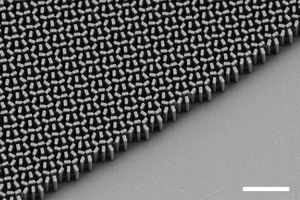Dartmouth, NS: Darren Fisher, Member of Parliament for Dartmouth-Cole Harbour announced an award of $5,395,000 October 12 for Metamaterial Technologies Inc. (MTI) to develop next generation solar technology for hybrid vehicles.
 Left to Right – Ian Hill, Academic Vice President, Dalhousie University, George Palikaras, Founder and CEO of Metamaterial Technologies, Mark Brongersma, Professor Department of Materials Science and Engineering Stanford University, Darren Fisher, Member of Parliament for Dartmouth-Cole Harbour, Gary Biermann, Regional Technology Manager – Canada, Global Science and Technology Engagement Lockheed Martin Corporation, and Andrea Canino Research & Development 3SUN S.r.l. Enel Green Power Group
The investment in MTI will be part of a $17.9M initiative to develop this technology and brings together industry leaders such as ENEL Green Power and Lockheed Martin as well as Dalhousie University, the California Institute of Technology and Stanford University. The technology, called metaSOLAR, has the potential to lead to greener vehicle alternatives. MTI says it utilizes the latest achievements in optical science, metamaterials, semiconductors and nanofabrication. Its patented solar technology has been engineered to collect, trap and absorb solar light from all directions at wide angles, significantly improving efficiency, removing the need to track the sun.
Left to Right – Ian Hill, Academic Vice President, Dalhousie University, George Palikaras, Founder and CEO of Metamaterial Technologies, Mark Brongersma, Professor Department of Materials Science and Engineering Stanford University, Darren Fisher, Member of Parliament for Dartmouth-Cole Harbour, Gary Biermann, Regional Technology Manager – Canada, Global Science and Technology Engagement Lockheed Martin Corporation, and Andrea Canino Research & Development 3SUN S.r.l. Enel Green Power Group
The investment in MTI will be part of a $17.9M initiative to develop this technology and brings together industry leaders such as ENEL Green Power and Lockheed Martin as well as Dalhousie University, the California Institute of Technology and Stanford University. The technology, called metaSOLAR, has the potential to lead to greener vehicle alternatives. MTI says it utilizes the latest achievements in optical science, metamaterials, semiconductors and nanofabrication. Its patented solar technology has been engineered to collect, trap and absorb solar light from all directions at wide angles, significantly improving efficiency, removing the need to track the sun.
“Transport accounts for about 19 percent of global energy use and 23 percent of energy-related carbon dioxide (CO2) emissions. Transport energy use and CO2 emissions are projected to increase by nearly 50% by 2030 and more than 80% by 2050,” said George Palikaras, Founder and CEO of MTI. “At MTI, our team is working to develop and commercialize a new product called metaSOLAR, which will be the first light-weight and high-efficiency silicon-based solar cell technology, suitable for the transport industry here in Canada and the globally.”
 From Wikipedia: A metamaterial (from the Greek word meta, meaning “beyond”) is a material engineered to have a property that is not found in nature. They are made from assemblies of multiple elements fashioned from composite materials such as metals or plastics. The materials are usually arranged in repeating patterns, at scales that are smaller than the wavelengths of the phenomena they influence. Metamaterials derive their properties not from the properties of the base materials, but from their newly designed structures.
Lamda Solar films have the potential to increase solar cell efficiency by collecting and absorbing light. They increase the absorption of sunlight in solar panels by trapping light from all angles, without the need for concentrators or tracking systems. Lamda Solar technology utilizes the latest achievements in optical science, semiconductors and nanotechnologies.
From Wikipedia: A metamaterial (from the Greek word meta, meaning “beyond”) is a material engineered to have a property that is not found in nature. They are made from assemblies of multiple elements fashioned from composite materials such as metals or plastics. The materials are usually arranged in repeating patterns, at scales that are smaller than the wavelengths of the phenomena they influence. Metamaterials derive their properties not from the properties of the base materials, but from their newly designed structures.
Lamda Solar films have the potential to increase solar cell efficiency by collecting and absorbing light. They increase the absorption of sunlight in solar panels by trapping light from all angles, without the need for concentrators or tracking systems. Lamda Solar technology utilizes the latest achievements in optical science, semiconductors and nanotechnologies.
The company says it is one of the first to commercialize metamaterials at a large scale. Until now, these materials have been prohibitively expensive to produce and only available in small sizes, limiting their commercial applications.
